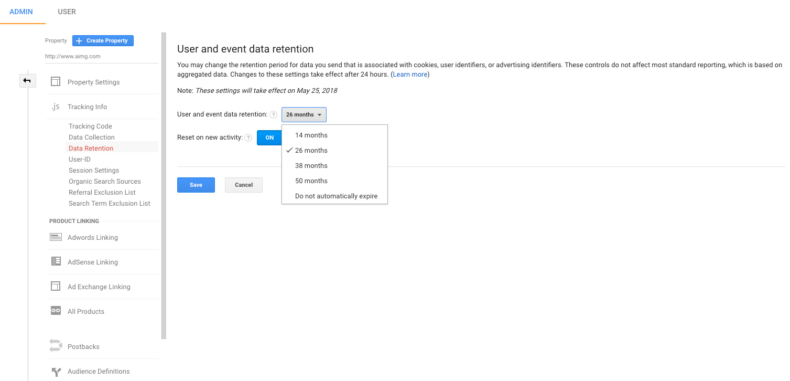
The European Union’s (EU) General Data Protection Regulation (GDPR) is set to be enforced May 25th, 2018. In just a few days, this comprehensive set of privacy regulations will launch and affect businesses around the world. Even if you don’t conduct business in the EU, many international companies are rolling out global changes to their products which will affect how you use them.
Google’s business model is deeply affected by regulations like the GDPR and as a result, they’ve introduced changes to their products that affect everyone, not just businesses located in the EU or those collecting personally identifiable information (PII) from EU citizens.
One of the biggest changes Google’s rolling out is new Data Retention Controls for Google Analytics. For any company that uses Google Analytics for historical data analysis to understand website behavior and performance, or any company that plans to scale their marketing efforts in the next few years, it’s critical that you act before the May 25th GDPR deadline to retain many of your basic Google Analytics functions.
What Changes are Coming to Google Analytics?
Google recently announced new Data Retention Controls for Google Analytics users. Essentially, users now have the option to have their historical data deleted after 14 months, 26 months, 38 months, 50 months, or to retain historical data indefinitely. If you don’t change anything in your Google Analytics settings before May 25th, much of your historical data beyond 26 months will be permanently deleted.
 There are specific kinds of data that will be affected by the new Data Retention Controls. On Google’s support page for data retention they say, “Keep in mind that standard aggregated Google Analytics reporting is not affected. The user and event data managed by this setting is needed only when you use certain advanced features like applying custom segments to reports or creating unusual custom reports.”
There are specific kinds of data that will be affected by the new Data Retention Controls. On Google’s support page for data retention they say, “Keep in mind that standard aggregated Google Analytics reporting is not affected. The user and event data managed by this setting is needed only when you use certain advanced features like applying custom segments to reports or creating unusual custom reports.”
This may sound reassuring, but there are big changes occurring here. The “standard aggregated reports” they speak of are the basic reports on web traffic and behavior under the Audience, Acquisition, Behavior, and Conversions categories. While these reports are important, they’re limited. They hardly scrape the surface of what you can do in Google Analytics to understand the performance of your digital presence.
What’s at risk with the new Data Retention Controls are ad-hoc reports. Without making changes to data retention settings, you’ll lose your ability to segment, filter, generate custom reports, and apply secondary dimensions on data older than 26 months.
Each one of these types of analysis are critical functions in Google Analytics. Any business with serious intentions of growing their online presence, or any business that plans to scale their marketing efforts in the next few years, will be severely limited without this data for historical, comparative analysis.
Fixing Data Retention Controls in Google Analytics
The GDPR has no explicit length of time that data can be retained, it simply mentions that data should only be kept for as long as it’s needed. For those who conduct business in the EU, it’s best to consult legal counsel on the length of time that keeps you compliant.
For those who do not conduct business in the EU, changing your Data Retention Settings to “Do not automatically expire” is the best option, although it’s still wise to consult legal counsel.
The fix for this issue is quite simple. For each affected Google Analytics account, go to the Admin tab on the left side. Under ‘.js Tracking Info’, choose ‘Data Retention’ and select the time frame you desire. That’s all you have to do to avoid your data being deleted.

As mentioned, historical analysis using secondary dimensions and filters is a foundational aspect of Google Analytics. Any serious marketing operation will need access to this data at some point, so taking the time to retain this data now will go a long way in scaling marketing efforts in the future.
While it’s recommended you retain data indefinitely, it’s important to still ensure you’re in compliance with regional requirements for the GDPR. If you conduct business in the EU, you must have a legitimate reason for retaining this data for so long.
The changes Google is making to data retention is a response to the GDPR requirements, but it affects every business that uses Google Analytics, regardless of whether they’re bound by the GDPR or not.
It’s important you take action before May 25th and change the settings in your Google Analytics account. Otherwise, you’ll lose vital capabilities in analysis that fuel data-driven marketing operations.
